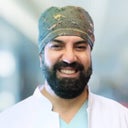Thank you for your question. You're twenty-six-years-old, you state you have a four year history of hair loss you're a Norwood four by your description and that you describe a situation where it appears you have been attempting to help yourself with some homeopathic intervention and that your concern is that you're getting very fine hairs and you want to know if PRP can boost your hair growth.Well I can certainly give you an opinion from my experience, I've been practicing cosmetic surgeon for over twenty years in Manhattan and long Island and I've been performing hair transplant surgery for this time and I use PRP a lot in my practice, both for hair and for cosmetic indications, in addition I'm the founder of Trichostem Hair Regeneration centers which is a non-surgical alternative to hair transplant for people with thinning hair, using PRP in addition to a material called Extracellular Matrix that we've developed over several years.So I can definitely give you an opinion. Now that being said I want to also just state for the record that I am not disparaging any doctor who uses PRP alone for the treatment of hair loss as physicians we do a lot of things based on our own clinical experience and so I'm sharing with you my clinical experience.So here we go, with using PRP you have to think about the concept of wound healing and the reason is that PRP has a lot of benefits that stimulate wound healing by the addition of new blood vessels the stimulation of collagen and the derivation of PRP in the aesthetic field we have to thank the oral surgeons who first started using PRP for the improvement of vascularity in the mandible for dental implants and then the orthopedic surgeons for using PRP for joint and for tendon and other orthopedic indication.So when you think about the physiology of hair loss we have to understand a couple things with male or female pattern hair loss we're dealing with a genetic pattern that programmed it's hard wired into the genetics for the hair to thin with male pattern hair loss there is an understanding a well-established understanding of the effects of DHT or Dihydrotestosterone on susceptible hair that's why the drug Finasteride exists and can be successful and there are estimation of approximately sixty percent of men will respond but at the same time there are a lot of men who don't respond.In our practice we've developed something called Hair Regeneration that we've further now have created a company called Trichostem to where we found a benefit of using a combination of a cellular matrix with platelet-rich plasma and with this material we intended to help the hair transplant patients heal better, we wanted to improve the growth of the grafts in terms of survivability and viability as well as the donor area in terms of healing and what was serendipitously discovered was that thinning hair became thicker.Over several years we have been treating patients and developed a process of protocol and we follow our patients very closely, what we do is we do a combination of Extracellular matrix, Platelet-rich plasma and other ingredients that we dose based on an algorithm we developed in our practice.When we do this injection we typically do one injection and possibly a second injection after critical time frame after we follow our patient to maximize the results what we found that we're able to actually with the right patient who has thinning hair exceed the results of two hair transplants, because when thinning hair, as you described becomes thicker the coverage based on the diameter improvement in the hair and the density which is already there as opposed to a transplant where you are trying to create density is can be dramatic and can be remarkable.With 99 percent of male pattern hair loss patients responding favorably to his treatment we have patients who come from around the world to our offices in Manhattan long Island and now we're bringing this technology out to people so that we can help more people with this treatment. So from my experience, when we we're just would use PRP alone I observed that PRP helped the hair grafts heal better and certainly helps a lot in stimulating skin quality and tissue quality.But it doesn't seem to have an impact on stopping the progression of hair loss it may stimulate a short-term burst of growth of existing hair it may slightly prolong the growth cycle of a thinning hair comparable to Minoxidil, but I would not say that PRP alone will stop hair loss.It is very straightforward, we have seen patients who come to us who did PRP injections elsewhere they would be very dedicated and committed to go every month every month for a couple years and they still kept on losing hair when we did one Hair Regeneration treatment within a few months it was observed that their hair got thicker.So clearly the physiology of hair loss is far more complex than what we understand with just the genetics and DHT there are certainly other factors that we have serendipitously been able to leverage to help people stop their progression with hair loss.So with that being said I think you need to learn more and do some more research, but I would say to you that PRP alone is not going to be the solution you're looking for.So learn more about your options and hopefully this is a value to you. So once again, I hope that was helpful and thank you for your question.






